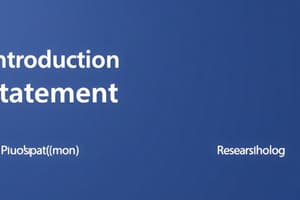Podcast
Questions and Answers
What is the primary purpose of the introduction in a research study?
What is the primary purpose of the introduction in a research study?
- To collect data from the subjects involved
- To convince the reader that the research topic is worth studying (correct)
- To provide detailed methodology of the research
- To present the final results of the research
Which of the following is NOT a key aspect mentioned for a research problem's background?
Which of the following is NOT a key aspect mentioned for a research problem's background?
- Present state of knowledge regarding the problem
- General orientation to the problem area
- Detailed statistical analysis of previous results (correct)
- Brief rationale to justify the problem
Why is it important to show a data gap in a research study?
Why is it important to show a data gap in a research study?
- To demonstrate the researcher’s statistical prowess
- To identify unanswered questions that justify further research (correct)
- To convince readers of the author's expertise in the field
- To summarize the findings of previous studies concisely
What should the introduction orient the reader about regarding the research study?
What should the introduction orient the reader about regarding the research study?
What key element should the introduction include to engage the reader?
What key element should the introduction include to engage the reader?
What does a brief rationale in the background of a study provide?
What does a brief rationale in the background of a study provide?
What type of questions should the introduction aim to address?
What type of questions should the introduction aim to address?
How should the present state of knowledge regarding the problem be conveyed?
How should the present state of knowledge regarding the problem be conveyed?
Which contemporary Filipino author is best known for highlighting the Filipino American experience?
Which contemporary Filipino author is best known for highlighting the Filipino American experience?
Which author is recognized for employing feminist themes in her literary works?
Which author is recognized for employing feminist themes in her literary works?
What is a central theme explored by N.V.M. Gonzalez in his literary works?
What is a central theme explored by N.V.M. Gonzalez in his literary works?
Which of the following authors is known for the book 'The Rosales Saga'?
Which of the following authors is known for the book 'The Rosales Saga'?
Which author blends elements of fantasy with themes of love and loss in her debut novel?
Which author blends elements of fantasy with themes of love and loss in her debut novel?
Which contemporary Filipino author is known for the innovative use of poetry and focuses on identity?
Which contemporary Filipino author is known for the innovative use of poetry and focuses on identity?
What theme is commonly found in the works of Jessica Hagedorn?
What theme is commonly found in the works of Jessica Hagedorn?
Which theme is NOT typically associated with contemporary Filipino literature?
Which theme is NOT typically associated with contemporary Filipino literature?
Flashcards are hidden until you start studying
Study Notes
Problem and Background
- Existence of a problem leads to current research efforts.
- Introduction must engage readers and highlight the significance of the research topic.
- The study must orient readers on the motivations behind the research.
- Identification of data gaps and unresolved questions is crucial for framing the research.
Importance of the Problem
- Importance and validity of the chosen problem must be clearly articulated.
- A background synopsis is needed to provide general orientation to the problem area.
Justification for the Study
- A brief rationale should justify the relevance of the problem being studied.
- Present state of knowledge on the issue should be reviewed to inform readers about existing understanding.
Contemporary Filipino Authors
-
Jose Rizal
- Renowned as the national hero of the Philippines; pivotal in the fight against colonialism.
- Authored "Noli Me Tangere" and "El Filibusterismo," which critique oppression and explore national identity.
-
Carlos Bulosan
- Key figure in literature reflecting the Filipino American experience during the 20th century.
- His book "America is in the Heart" captures social injustices faced by Filipinos in America.
-
N.V.M. Gonzalez
- Esteemed for his short stories and novels that delve into Filipino identity and cultural heritage.
- His works often reflect the complexities of Filipino life and traditions.
-
F. Sionil José
- Provides incisive commentary on Philippine society, class struggles, and the legacies of colonialism through his writings.
- Best-known for "The Rosales Saga" and "Po-on," which resonate with themes of heritage and social justice.
-
Lualhati Bautista
- Significant feminist voice in Philippine literature, advocating for women's rights.
- "Bata, Bata...Pa'no Ka Ginawa?" addresses critical social issues affecting women in society.
-
Jessica Hagedorn
- Notable author and performance artist recognized for her novel "Dogeaters."
- Explores themes of globalization, identity struggles, and cultural conflict within Filipino society.
-
Miguel Syjuco
- Recognized for his debut novel "Ilustrado," which intertwines the complexity of Filipino identity with socio-political nuances.
- His work is a blend of fiction and rich commentary on history.
-
Eileen R. Tabios
- Innovative poet and author acclaimed for her unique approach to poetry.
- Works often examine themes of personal and cultural identity, including experiences of the Filipino diaspora.
-
Samantha Sotto
- Made a mark with her debut novel "Before Ever After," combining fantasy with poignant themes of love and loss.
-
Clarissa O.H. Alabanza
- An emerging voice in contemporary literature representing the youth experience.
- Her writing engages with modern Filipino life and the challenges faced by young people today.
Key Themes in Contemporary Filipino Literature
- Exploration of identity and cultural heritage rooted in Filipino history and experiences.
- Strong focus on social justice, reflecting the realities and struggles within Philippine society.
- Emphasis on feminism and gender issues, advocating for women's rights and representation.
- Discussion of globalization and the diasporic experience, considering how these affect identity.
- Intersecting historical narratives with modern realities to provide a comprehensive viewpoint.
Notable Literary Forms
- Wide variety of forms including novels, short stories, poetry, essays, and performance literature.
- Encouragement of diverse storytelling approaches within contemporary Filipino literature.
Influence and Recognition
- Contemporary authors play a crucial role in enriching global literature, offering unique perspectives.
- Many works have received international praise and translations, expanding their reach.
- Literature reflects universal themes while maintaining the essence of Filipino experiences, enhancing cross-cultural exchange.
Studying That Suits You
Use AI to generate personalized quizzes and flashcards to suit your learning preferences.




